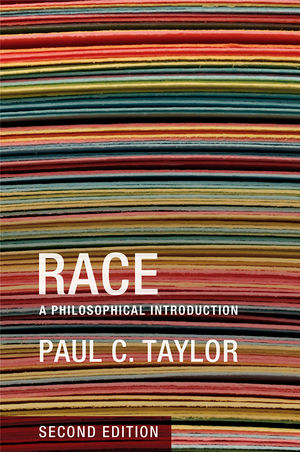Race: A Philosophical Introduction, 2nd EditionPosted in Biography, Books, Media Archive, Monographs, Philosophy, Social Science on 2013-02-21 20:11Z by Steven |
Race: A Philosophical Introduction, 2nd Edition
Polity Press
February 2013
240 pages
Hardcover ISBN: 978-0-7456-4965-8
Paperback ISBN: 978-0-7456-4966-5
Paul C. Taylor, Associate Professor of Philosophy
Pennsylvania State University
In Race: A Philosophical Introduction, Second Edition, Paul C. Taylor provides an accessible guide to a well-travelled but still-mysterious area of the contemporary social landscape. As in the first edition, the book blends metaphysics and social philosophy, analytic philosophy and pragmatic philosophy of experience. In this thoroughly updated and revised volume, Taylor outlines the main features and implications of race-thinking, while engaging the ideas of such important figures as Linda Alcoff, K. Anthony Appiah, W. E. B. Du Bois, Michel Foucault, Sally Haslanger, and Howard Winant. The result is a comprehensive but accessible introduction to philosophical race theory and to a non-biological and situational notion of race.
The book unfolds in a sequence of five chapters, each devoted to one of the following questions: What is race-thinking? Don’t we know better than to talk about race now? Are there any races? What is it like to have a racial identity? And how important, ethically, is colorblindness? On the way to answering these questions, Race takes up topics like mixed-race identity, white supremacy, the relationship between the race concept and other social identity categories and the impact of race-thinking on our erotic and romantic lives. The second edition’s new concluding chapter explores the racially fraught issues of policing, immigration, and global justice, and interrogates the thought that Barack Obama has ushered in a post-racial age. This volume is suitable for the educated general reader as well as for students and scholars in ethnic studies, philosophy, sociology, and other related fields.
Features
- Fully updated and revised edition of this comprehensive but accessible introduction to philosophical race theory.
- Blends metaphysics and social philosophy, analytic philosophy and pragmatic philosophy of experience and engages the ideas of such important figures as Linda Alcoff, K. Anthony Appiah, W. E. B. Du Bois, Michel Foucault, Sally Haslanger, and Howard Winant.
- Taylor examines key topics such as mixed-race identity and white supremacy as well as timely examinations of racially fraught issues of policing, immigration, and global justice.
- This compelling volume will appeal to students and scholars in ethnic studies, philosophy, sociology, and other related fields.
Table of Contents
- Preface.
- Part I: Theory:.
- 1. What Race-Thinking Is:.
- The Language Of Race.
- What We Mean By ‘Race’: What Do You Mean, ‘We’?.
- Modern Racialism: Prehistory And Background.
- Power, Racial Formation, And Method.
- Conclusion.
- 2. Three Challenges To Race-Thinking:.
- Introduction.
- The Anti-Racist Challenge, Take 1: Isn’t Race-Thinking Unethical?.
- What Racism Is.
- Classical Racialism: History And Background.
- Early Modern Racialism.
- High Modern, Or Classical, Racialism.
- The Concept Of Classical Racialism.
- The Challenge Of Human Variation: Isn’t Racial Biology False?.
- What’s Wrong With Race.
- The Challenge Of Social Differentiation: Isn’t The Race Concept Just In The Way?.
- Ethnicity.
- Nation.
- Class.
- Caste.
- Intersecting Principles: Gender.
- Conclusion.
- 3. What Races Are:.
- Introduction.
- After Classical Racialism.
- The U.S. Racial Terrain Today.
- Varieties Of Racialism: Four Accounts And Ten Questions.
- What Races Are – A Radical Constructionist’s Story.
- Ten Questions.
- Conclusion.
- 1. What Race-Thinking Is:.
- Part II: Practice:.
- 4. Existence, Experience, Elisions:.
- Introduction.
- Ethical Eliminativism, For And Against; Or, The Anti-Racist Challenge, Take 2.
- The Slippery Slope And The Argument From Political Realism.
- The Argument From Self-Realization.
- Existence, Identity, And Despair.
- The Basics.
- Despair And Terror.
- Double-Consciousness.
- Micro-Diversity, Part I.
- Microdiversity, Part II.
- In-Between: Illusions Of Purity And Interstitial Peoples.
- Experience, Invisibility, And Embodiment.
- The Basics.
- Invisibility And The Other Mind-Body Problem.
- From The Ontic To The Ontological.
- Conclusion.
- 5. The Color Question:.
- Introduction.
- Color And ‘Courting’: The Ethics Of Miscegenation.
- Colorblindness And Affirmative Action.
- Conclusion.
- 4. Existence, Experience, Elisions:.
- A Note On Further Reading.
- Endnotes
